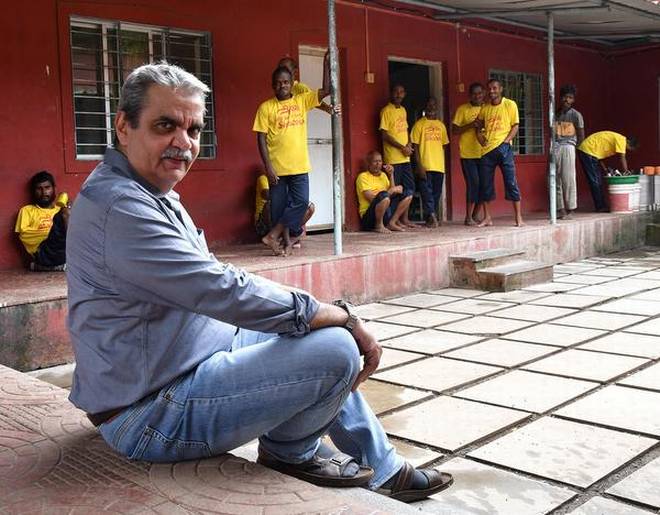Ramon Magsaysay Award winner and psychiatrist Bharat Vatwani’s Shraddha Rehabilitation Foundation helps with treatment, rehabilitation and reunion of mentally-ill homeless people with their families.

In 2016, a 25-year-old man from Nanded, Maharashtra, stepped inside his home two months after he had suddenly disappeared. A garlanded picture of him hung on the wall in front of the main door. As soon as he entered the house, a commotion broke out. His elderly parents began crying with joy. His young wife began thanking the lord loudly. “But what touched us was the wife rushing indoors amid the chaos and coming back dressed in her brightest sari. She had put her mangalsutra back on and prominently wore a bindi,” says psychiatrist Dr Bharat Vatwani, 60, who was instrumental in this reunion.
The man, who was diagnosed with schizophrenia, had wandered off one day, not knowing how to get home. His family did everything they could to trace him, and eventually accepted that something untoward had happened and performed rituals to rest his soul.
However, a police patrol that found him, took him to Dr Vatwani’s Shraddha Rehabilitation Foundation in Karjat, near Mumbai, where mentally-ill homeless people are treated, rehabilitated and then reunited with their families. The 25-year-old is one of the 7,000 mentally-ill patients that Dr Vatwani and his team have reunited in the past two decades. His immense work in the field got noticed and he was named the winner of the prestigious Ramon Magsaysay Award, which he will accept at a ceremony to be held in the Philippines later this month.
Dr Vatwani says that almost all the reunions they do are emotionally overwhelming. “Most families accept the patients wholeheartedly. But we do have a few cases where the families don’t want them back, or in some cases we can’t trace the families. In such scenarios, we hand over the patients to NGOs who house the destitute,” says Dr Vatwani, adding that 85% of patients they get have schizophrenia.
The symptoms
“You will typically spot such patients wandering, talking to themselves, screaming in the vacuum, and behaving violently. These are classic effects of schizophrenia, and while the patient is in that space, he or she wanders away, often getting lost,” he said.
The centre’s social workers go on rounds in an ambulance to trace the mentally ill. They also get calls from locals, sometimes the police, and at times Dr Vatwani and his wife Smitha, also a practising psychiatrist, spot such wanderers and bring them to the facility. Besides schizophrenia, a small number of patients that his centre handles, have bipolar disorder and depression. Most spend two to three months in the facility, and as they become better with medication, they start revealing more about their home and family. The social workers strike a bond with them and the process of reunion starts then.
The guiding light Dr Vatwani cites Baba Amte as his biggest influence
Shraddha has 20 social workers, eight nurses and three more doctors besides Dr Vatwani and his wife. They help in the recovery process, and take the patient to their hometown, and often, with minimal details dig out information with the help of the police and the locals.
“It is an investigative process,” says Shailesh Sharma, a psychologist at the centre, who reunited a man with his family after 54 years, among many other patients. The man had wandered away when he was 14 and was reunited with his family at the age of 68 in Jalandhar, with tiny nuggets of information: that he lived in a place called Basti, and that there was a flour mill near his house. “We went to all ‘Basti’s and finally found the one that had an old flour mill,” says Sharma.
Be a good Samaritan
If you have noticed a homeless person in the city, who you suspect is suffering from a mental illness, contact The Banyan at its 24×7 hotline, 9677121099.
Dr Vatwani’s journey began in 1997, when he and his wife spotted a frail young man drinking water from a gutter. The couple took him to their nursing home in Borivali, Mumbai, treated and reunited him with his family in Andhra Pradesh. It turned out that the young man was a BSc graduate. Later, the couple helped a well-known professor with schizophrenia from Sir JJ School of Art, who was wandering on Mumbai roads for over two years. After treatment, Dr Vatwani fought for him to get his job back. This triggered an overwhelming response from art students, who organised a fund-raiser art exhibition for Dr Vatwani’s cause.
The doctor used the proceeds to start his first 20-bed centre in Dahisar, Mumbai, in a small bungalow. In 2006, he moved the centre to Karjat, in a 6.5-acre plot he purchased with more donations. The Karjat centre accommodates up to 120 patients and it currently has 77 males and 47 females. Dr Vatwani credits the expansion to Baba Amte, who inspired him to increase his reach.
First published by The Hindu on 6 Aug. 2018